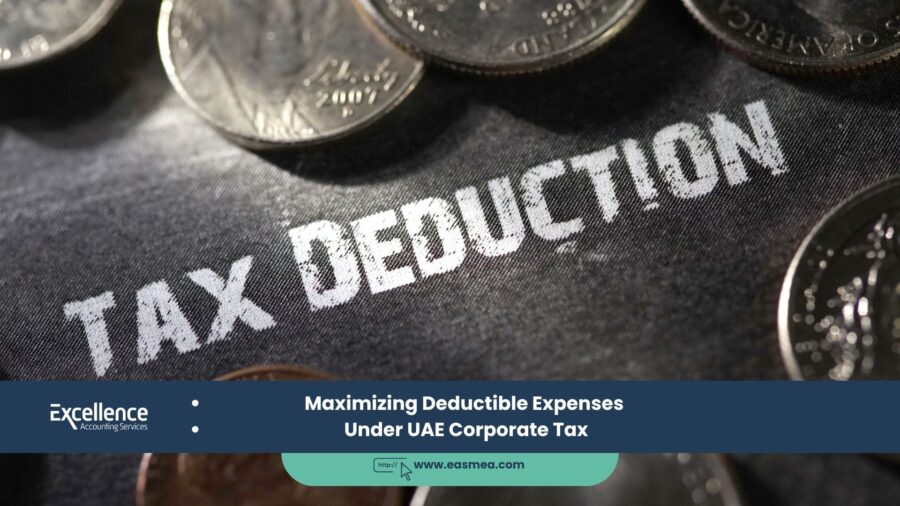Maximizing Deductible Expenses Under UAE Corporate Tax
The introduction of Corporate Tax in the UAE has fundamentally shifted the financial landscape for businesses. While the headline 9% rate is the focus of most discussions, the true measure of a company’s tax liability lies not just in its revenue, but in what it can legally deduct from that revenue. The strategic management of deductible expenses is the most powerful tool businesses have to optimize their tax position, reduce their financial burden, and enhance their profitability. Simply put, every Dirham of legitimately claimed expense is a Dirham not subject to tax.
- Maximizing Deductible Expenses Under UAE Corporate Tax
- Part 1: The Golden Rule of Deductibility - Article 28
- Part 2: A Deep Dive into Key Deductible Expense Categories
- Part 3: The Red Flags - Partially Deductible and Non-Deductible Expenses
- Part 4: The Unbreakable Foundation - Documentation
- What Excellence Accounting Services (EAS) Can Offer
- Frequently Asked Questions (FAQs)
- Optimize Your Tax Position with Expert Guidance.
However, navigating the landscape of tax deductions is not a simple exercise. It requires a deep understanding of the law, meticulous record-keeping, and a clear distinction between what is permissible and what is prohibited. This guide provides a comprehensive framework for UAE businesses to master the art of expense deductibility. We will explore the foundational “wholly and exclusively” principle, dissect key categories of deductible and non-deductible expenses, highlight the critical role of documentation, and outline how your business can build a compliant and tax-efficient expense management strategy.
Key Takeaways for Expense Deductibility
- The “Wholly and Exclusively” Rule: The primary test for any expense is that it must be incurred solely for the purpose of the taxpayer’s business.
- Documentation is Non-Negotiable: An expense cannot be deducted without verifiable proof, such as a valid invoice, receipt, or contract.
- Some Expenses are Capped: Certain expenditures, like client entertainment, are only partially deductible (50% cap).
- Fines and Penalties are Not Deductible: Costs incurred as a result of violating the law cannot be used to reduce your taxable income.
- Capital vs. Revenue Expenditure: The cost of acquiring a long-term asset (capital) is not immediately deductible; instead, it is depreciated over its useful life.
Part 1: The Golden Rule of Deductibility – Article 28
The entire framework for expense deductions under UAE Corporate Tax Law is built upon the principle outlined in Article 28. It states that an expense is deductible only if it is incurred “wholly and exclusively” for the purposes of the taxpayer’s business.
Breaking Down “Wholly and Exclusively”
This principle acts as a filter for every cost a business incurs. It means the expense must not have a dual purpose; it cannot be for both business and personal benefit. The primary motive for the expenditure must be to generate taxable income for the business.
| Example of a “Wholly and Exclusively” Expense | Example of a Non-Deductible Dual-Purpose Expense |
|---|---|
| The monthly rent for the company’s office premises. The purpose is 100% for the business. | The cost of a family vacation for the company’s owner, even if some business calls were made. The primary purpose is personal. |
| Salaries paid to employees for their work. The purpose is solely to facilitate business operations. | School fees for an employee’s children, unless it is part of an official, non-discriminatory remuneration policy. |
Understanding and correctly applying this principle is the first and most critical step in building a compliant tax strategy. Any expense claim that fails this fundamental test will be disallowed by the Federal Tax Authority (FTA).
Part 2: A Deep Dive into Key Deductible Expense Categories
While the “wholly and exclusively” rule applies to everything, the law provides clarity on several specific categories of expenses that are generally deductible, provided they meet the core condition.
General & Administrative Expenses
This is the broadest category and includes most day-to-day operational costs:
- Salaries, Wages, and Bonuses: All forms of employee remuneration are deductible. A robust payroll service ensures these are accurately tracked and documented.
- Office Rent and Utilities: The cost of your physical or virtual office space, electricity, water, and internet are fully deductible.
- Professional Fees: Payments to lawyers, auditors, tax consultants, and other professional advisors are deductible. This includes fees for services like external audits and business consultancy.
- Marketing and Advertising: Costs incurred to promote your business and generate sales are fully deductible.
Interest and Financial Costs
Interest incurred on loans taken for business purposes is deductible, but with important limitations. The UAE has implemented a “general interest deduction limitation rule,” capping the net interest expense that can be deducted at 30% of the business’s EBITDA (Earnings Before Interest, Tax, Depreciation, and Amortization). This is a complex area where professional financial advice from a CFO service is highly recommended.
Bad Debts
You can deduct a bad debt (an amount owed to you that you cannot collect) only if you meet strict conditions:
- The amount must have been included in your taxable income previously.
- You must have written the debt off in your financial statements.
- You must have taken all reasonable steps to collect the debt.
A disciplined accounts receivable process is essential to demonstrate that all reasonable collection efforts were made.
Part 3: The Red Flags – Partially Deductible and Non-Deductible Expenses
Knowing what you *cannot* claim is just as important as knowing what you can. The law specifically blocks or limits the deduction of certain types of expenses.
Entertainment Expenses (50% Deductible)
Expenses related to entertaining customers, shareholders, suppliers, or other business partners are only 50% deductible. This includes costs for meals, accommodation, transportation, and admission fees for events. It is crucial to segregate these costs in your accounting system.
Example: If you take a client to a business lunch that costs AED 500, you can only claim a deduction of AED 250 (50% of 500).
Fully Non-Deductible Expenses
- Fines and Penalties: Any penalty imposed for a violation of the law is not deductible.
- Donations: Only donations made to an approved “Qualifying Public Benefit Entity” are deductible. Donations to other charities are not.
- Dividends and Profit Distributions: These are an appropriation of profit, not an expense incurred to generate it, and are therefore not deductible.
- Expenses Related to Exempt Income: If you incur an expense to generate income that is exempt from Corporate Tax, that expense is not deductible.
- Bribes and Illicit Payments: These are explicitly non-deductible.
Part 4: The Unbreakable Foundation – Documentation
An expense claim without proof is merely an assertion. Under UAE Corporate Tax Law, every deductible expense must be supported by adequate documentation that can be presented to the FTA upon request. Without this foundation, your deductions can be disallowed, leading to a higher tax bill and potential penalties.
The Role of a Modern Accounting System
Manually tracking thousands of invoices and receipts is inefficient and prone to error. A robust accounting system is the cornerstone of modern tax compliance. Software like Zoho Books is specifically designed to manage this process. It allows you to digitize receipts, categorize expenses correctly (e.g., flagging entertainment costs for the 50% cap), and generate detailed reports that substantiate your tax return. A professional accounting system implementation ensures your chart of accounts is structured for tax compliance from day one.
What Excellence Accounting Services (EAS) Can Offer
Effectively managing deductible expenses is a core component of strategic tax planning. At EAS, we provide expert guidance and hands-on support to ensure your business is compliant, efficient, and optimized for tax savings.
- Corporate Tax Advisory: Our experts provide strategic advice on structuring your business operations and transactions to maximize legitimate deductions under the UAE Corporate Tax law.
- Comprehensive Bookkeeping: We offer meticulous accounting and bookkeeping services to ensure every expense is correctly recorded, categorized, and documented.
- Expense Policy Review: We conduct a thorough accounting review of your expense policies to identify areas of non-compliance and opportunities for tax optimization.
- FTA Audit Preparation and Support: Our internal audit services prepare your business for FTA scrutiny, ensuring your expense claims are robust and defensible.
- Financial Reporting: We provide clear and accurate financial reports that form the basis of your corporate tax return and substantiate your deductions.
Frequently Asked Questions (FAQs)
Yes, provided the salary is a reasonable amount that reflects the fair market value for the services you provide. Excessive salaries paid to owners or connected persons could be scrutinized by the FTA under transfer pricing rules to ensure they are at arm’s length.
Yes. These are considered part of the overall cost of employment and are incurred wholly and exclusively for the business. Therefore, they are fully deductible.
Yes. You cannot deduct the full purchase price of a capital asset (like a vehicle or machinery) in the year of purchase. Instead, you deduct a portion of its cost each year through depreciation, in line with accepted accounting standards.
This is a complex area. You can potentially deduct expenses related to a specific part of your home used exclusively and regularly as your principal place of business. This requires a clear, reasonable basis for apportionment (e.g., based on square footage) and meticulous record-keeping. It’s highly advisable to seek professional tax advice for this.
Yes, these are known as “pre-commencement” or “start-up” expenses. They can be deducted if they were incurred in connection with the business. The specific rules on how they are amortized or deducted should be followed.
An expense is a cost that has actually been incurred. A provision is an amount set aside in the accounts for a future liability of uncertain timing or amount (e.g., provision for warranty claims). Generally, provisions are not deductible for tax purposes until the expense is actually incurred.
Yes, but you must have a valid receipt or invoice as proof of the expense. Large or unusual cash transactions may attract greater scrutiny from the FTA, so maintaining clear documentation is even more critical.
Yes, but it is subject to transfer pricing rules. The interest rate must be at an “arm’s length” rate—the same rate that would be charged between two independent parties. Any excess interest could be disallowed.
Without an invoice or other verifiable documentation, the FTA has the right to disallow the deduction. For every expense, no matter how small, you should make every effort to obtain a receipt. Lack of documentation is one of the most common reasons for deductions being denied during a tax audit.
Yes. Costs associated with training and professional development for your employees are considered to be for the benefit of the business and are fully deductible, provided they are relevant to the employees’ roles and the company’s operations.
Conclusion: Turning Compliance into a Strategic Advantage
Mastering the rules of deductible expenses is fundamental to effective corporate tax management in the UAE. It transforms tax compliance from a passive, year-end activity into an active, ongoing strategy. By embedding the principles of “wholly and exclusively,” meticulous documentation, and a clear understanding of the legal boundaries into your daily operations, your business can confidently minimize its tax liability, optimize its financial resources, and turn a regulatory requirement into a genuine strategic advantage.




